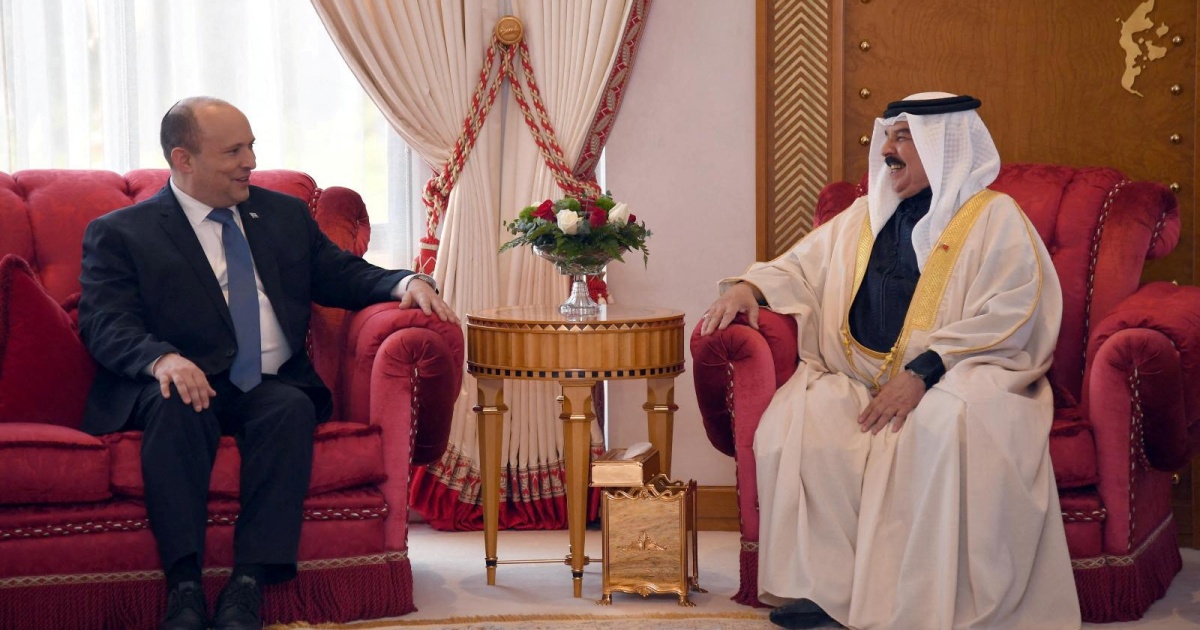
New allies stress willingness to deepen relationship as Bennett makes first visit by an Israeli prime minister to the Gulf country.
Israeli Prime Minister Naftali Bennett has met Bahrain’s king on a landmark visit to the oil-rich Gulf country, 17 months after they established relations under a 2020 US-sponsored deal based in part on shared concerns about Iran.
Bennett was making a one-day visit on Tuesday to the island kingdom, the first by an Israeli leader.
He was greeted by Crown Prince Salman bin Hamad Al Khalifa, who also serves as the kingdom’s prime minister, and a military colour guard at Manama’s Gudaibiya Palace. He told the crown prince that he came “with a spirit of goodwill, of cooperation, of standing together against mutual challenges”.
Bennett also met several government ministers and discussed the need for greater economic cooperation. “We want to fill this relationship with substance in energy, in drive, in economy, in tourism and in the regional architecture,” he said.
“We must do more to get to know one another and build upon the Abraham Accords, which have been such a historic agreement,” the crown prince said, referring to the US-brokered deal.
Bahrain’s king welcomed Bennett’s visit and emphasised the importance of strengthening the bilateral partnership in light of the so-called Abraham Accords, said the official Bahrain News Agency.
The king and Israeli prime minister “underlined keenness on further promoting bilateral relations and joint work to serve common interests as well as regional security, stability and development”, it reported.
In recent months, as tensions with Iran have soared, the two new allies have intensified military cooperation.
Early this month, they signed a defence pact, and last week, Bahrain announced that an Israeli naval officer would be stationed in Manama, which is also home to the US Navy’s 5th Fleet. The Israeli military confirmed it will have a naval representative attached to the 5th Fleet.
Contentious issue
Bennett met the fleet commander, Vice Admiral Brad Cooper, during his stop in Manama. Bennett’s office said the fleet “is a significant element in maintaining regional stability in the face of various security threats.”
It did not mention Iran specifically. But Israel has made no secret of its concerns about Iranian naval activities across the region.
Israel has stepped up its naval presence in the Red Sea after a series of attacks on commercial ships with links to Israel, which it blamed on Iran.
Earlier this month, Israeli ships took part in a naval exercise in the Gulf, which included ships from Oman and Saudi Arabia, with whom Israel does not have formal diplomatic ties. Israeli warships also participated in US-led naval drills with the United Arab Emirates and Bahrain in the Red Sea in November.
Israel and Bahrain have exchanged ambassadors and signed trade and defence agreements since they signed the normalisation agreement in September 2020.
The deals enraged the Palestinians, who felt a betrayal of their national cause. Palestinian leaders saw it as an abandonment of a longstanding commitment in the Arab world that calls for Israeli withdrawal from occupied territory and acceptance of Palestinian statehood in return for normal relations with Arab countries.
Bennett also met the small Jewish community of Bahrain, which comprises about 50 people.
After the signing of the normalisation deal, a small synagogue in the heart of Manama was renovated and reopened.
Bennett told Jewish community members there, “I’m very delighted to be here in Bahrain, and I could think of no better way to kick off this visit than seeing my family here.”
The outreach by Bahrain’s monarch, a Sunni Muslim, has been criticised by an opposition led by the Shia majority. The country has seen protests in solidarity with the Palestinians.
Normalisation with Israel remains a contentious issue for Bahrain’s Shia population, which long has accused the country’s rulers of treating them like second-class citizens.
Bennett’s visit came as negotiations between world powers and Iran to reach an international agreement to curb Tehran’s nuclear programme continued in Vienna. Israel has said it would not be bound by any such agreement and that it would take whatever action necessary, including a military attack, to prevent Iran from obtaining nuclear arms.
Iran has consistently said its nuclear programme is solely for peaceful purposes.







